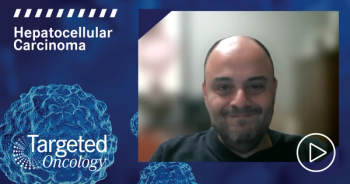
Case 3: A 63-Year-Old With Unresectable HCC Eligible for IO Therapy
In the setting of unresectable hepatocellular carcinoma, experts consider the role of frontline atezolizumab + bevacizumab given data from IMbrave150.
Episodes in this series

Transcript:
Ghassan K. Abou-Alfa, MD: Now that we covered quite a bit about lenvatinib, let’s look at the other options of treatment. One more case, a 63-year-old man this time, included hepatitis C about 8 years ago. At diagnosis no radiographic features suggestive of cirrhosis, a complaint to a gastroenterologist of abdominal pain, good performance status. He had a 2.7-cm liver lesion, 3 satellite lesions, confirmed HCC [hepatocellular carcinoma] by biopsy. It seems now we’re settling with the biopsy. The tumor was deemed unresectable, transarterial chemoembolization was performed 3 times, excellent response. But 6 months later there was multifocal disease in the abdominal wall, liver lesions, lung metastasis. He was still thankfully Child-Pugh A, BCLC [Barcelona Clinic Liver Cancer] [stage] C; weight is 80 kg, and AFP [alpha-fetoprotein] is very high at 24,000 ng/mL. This is a 63-year-old gentleman with hepatitis C, and at the same time, he had embolization multiple times after a confirmed diagnosis of HCC and now with multiple sites of disease and no concern for any bleeding, no varices, and no other contraindications. The therapies here are going to probably change, and I’ll again start with Dr Singal. In the first case we spoke about the concern for checkpoint inhibitors. Do you have any direct concern for checkpoint inhibitors here, and what would you recommend for therapy?
Amit Singal, MD: Ghassan, this is a relatively straightforward case. The patient has hepatitis C, cirrhosis, compensated, doesn’t appear to have any autoimmune diseases, doesn’t appear to have any portal hypertension as far as we know from this case, no history of variceal bleeding, etc. I don’t see any contraindications from a checkpoint inhibitor perspective. He’s been treated for his hepatitis C, and he’s unlikely to have significant portal hypertension in this case. He still should undergo an upper endoscopy to confirm that, in my opinion, but assuming that does not show high risk of stigmata, this is a perfect patient for atezolizumab and bevacizumab.
Ghassan K. Abou-Alfa, MD: I love it. You could not have said it any better. I like what you stressed, the critical need for the endoscopy, and of course, if there are no varices, the atezolizumab and bevacizumab. Let‘s look into this. Yes, the patient did receive atezolizumab and bevacizumab, which makes total sense, and the treatment is ongoing. This is the Imbrave150 study, which is atezolizumab and bevacizumab versus sorafenib, looking at the superiority. The study tested for overall survival, absolutely positive. As we can see, the results were 19.2 months for the atezolizumab and bevacizumab versus sorafenib 13.4 months. It’s a tad different in regard to the PFS [progression-free survival], but I wouldn’t sweat too much over this because we’re now talking about checkpoint inhibitors. However, the study is positive. Dr Singal is right in regard to the option of treatment being atezolizumab and bevacizumab, and there is no doubt that the therapy is helpful. Compared to what Dr Yarchoan told us about the hands-on experience in regard to the quality of life, we see some improvement or some preservation of quality of life compared to sorafenib. Are you seeing this in your practice, Dr Yarchoan?
Mark Yarchoan, MD: Yes, it’s hard to understand how important this is. In oncology, we often have to balance clinical benefit with toxicity, and here we have an agent that not only improved survival, but also made patients feel better. That, for me, is the ultimate win. It’s something that I definitely have experienced in my clinic, and this is great. Although, on the flip side, I wish we were doing even better. Survival still lags many other tumor types, and it’s why I believe we need even better therapies.
Ghassan K. Abou-Alfa, MD: I like the way you gave a very nice objective analysis of that data, but nonetheless, when we take it within the context of what we’re talking about, it’s appropriately encouraging. This could be reflective of the ultimate response that we get, and I think here the data we’re showing from the IMbrave150 study shows the enhanced response for atezolizumab plus bevacizumab. The duration of response was also favorable, 18 months compared to 14 months for sorafenib. All is going in that direction that Dr Yarchoan brought up.
Dr Salem, I would like to bring in one other important component over here in regard to who those patients are who will benefit the most. These are data that you and I know and we spoke about, by Dominik Pfister, PhD, that suggested the patients with nonviral HCC, ironically, might not fare that well or better compared to the viral etiologies for HCC. Let’s take it 2 ways. From your perspective, as an interventional radiologist, do you ever care about the etiology when it comes to a radioembolization?And what are your thoughts on those data?
Riad Salem, MD, MBA: Yes, we have looked at that, at least in the locoregional therapy space, and these types of analyses are hypothesis generating. You really can’t make that many conclusions from it. They are interesting, I’m sure they are generating other studies, but for us in the interventional radiology space, we look at the data in total, and we’ll discuss this with our hepatologist and our medical oncologist. We won’t really isolate and say, we will or won’t do this based on the etiology of your HCC. We will try to treat that patient individually. We’ll do the exact same thing irrespective of whether it is viral or nonviral etiology, even though there are some differences here. We’ll treat that patient the same. Now, I think some of the outcomes might be a little different, and some studies are ongoing, but it will not make any difference from the interventional radiology standpoint whether these subset analyses show that one group does better than the other.
Ghassan K. Abou-Alfa, MD: That’s very interesting and helpful. Dr Singal, as a pathologist, I would love to hear your analysis of those data, please.
Amit Singal, MD: I think, Ghassan, it’s as Riad was saying. It’s interesting and hypothesis generating, but I think that the way these analyses were done, there is residual confounding between the nonviral and the viral etiologies. So I don’t think this means that we should change anything we do. If somebody is eligible for atezolizumab and bevacizumab for other reasons, I would not withhold the benefits of those drugs based on liver disease etiology. Once again, these are interesting studies, the basic science side of this was well done. The clinical aspects in terms of how this translates from mice to humans, I think, is much less clear. If somebody has NASH [nonalcoholic steatohepatitis] or alcohol-associated cirrhosis with large intrahepatic tumor burden or advanced stage HCC, we are still using immune checkpoint inhibitors. I don’t think that this changes management at this point, but we’ll have to see. I think further studies will need to be done, but it doesn’t change anything right now.
Ghassan K. Abou-Alfa, MD: I’m very happy that all of us are seeing that these data are intriguing and bringing some perspectives, but at the same time, are not a determinant in regard to how we choose therapy. To our colleagues, as we are talking about atezolizumab and bevacizumab, which is a great choice, but as we just heard from Dr Singal and Dr Salem, please make sure you scope your patients. Don’t just go haphazardly because people can bleed on bevacizumab. In addition to that, as we are hearing the choice of therapy based on the checkpoint inhibitors, even though some data might suggest relatively less benefit, but still a benefit for the nonviral, it does not show data yet to decide to treat with one choice versus the other based on the risk factor. Everybody is still treated the same way.
Transcript edited for clarity.









































